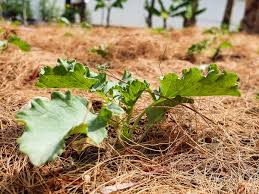Why Mulching is a Must-Have Practice for Kenyan Landscapes

What is Mulching?
Mulching is the process of covering soil with organic or inorganic materials to improve its quality and appearance. This practice is vital for maintaining healthy landscapes, especially in Kenya’s arid and semi-arid regions.
Benefits of Mulching for Kenyan Landscapes
1. Conserves Soil Moisture
Kenya’s climate can be harsh, with irregular rainfall patterns. Mulching helps retain soil moisture by reducing evaporation, ensuring plants stay hydrated for longer. This is particularly essential during dry seasons.
2. Reduces Soil Erosion
Heavy rains in Kenya often lead to soil erosion. Mulch acts as a protective layer, preventing the displacement of topsoil and maintaining soil fertility.
3. Enhances Soil Fertility
Organic mulch, such as grass clippings or bark, decomposes over time. This adds essential nutrients to the soil, promoting healthier plant growth.
4. Regulates Soil Temperature
Extreme heat can damage plant roots. Mulch acts as an insulating layer, keeping the soil temperature stable even during scorching days.
Types of Mulch Suitable for Kenya
Organic Mulch
- Grass clippings
- Wood chips
- Straw or hay
- Compost
Inorganic Mulch
- Gravel
- Stones
- Plastic sheets
Each type has its advantages, but organic mulch is often preferred for its ability to enhance soil health naturally.
How to Apply Mulch Effectively
1. Prepare the Area
Clear the ground of weeds and debris. Ensure the soil is moist before applying mulch.
2. Choose the Right Material
Select mulch that suits your plants and landscape design. Organic materials are ideal for gardens, while stones are great for walkways.
3. Apply an Even Layer
Spread mulch evenly, about 2-4 inches thick. Avoid piling it against plant stems to prevent rot.
Common Mulching Mistakes to Avoid
1. Over-Mulching
Applying too much mulch can suffocate plant roots and prevent water penetration.
2. Using Poor-Quality Mulch
Ensure your mulch is free from pests, weeds, or harmful chemicals to avoid damaging your plants.
3. Ignoring Maintenance
Over time, mulch may break down or shift. Regularly check and replenish it as needed.
Conclusion
Mulching is an essential practice for maintaining vibrant and sustainable landscapes in Kenya. It conserves water, prevents soil erosion, and boosts soil fertility. By choosing the right type of mulch and applying it correctly, you can transform your outdoor spaces into thriving, low-maintenance landscapes.